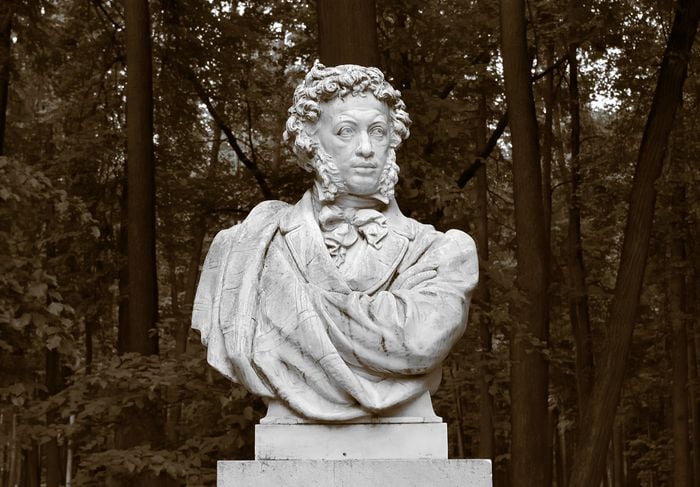Russia is here represented by ten stories. It was exceedingly difficult to select from among the many hundreds of available works precisely those which were the most readable and at the same time showed the development of the form.
Alexander Pushkin (1799-1837)
Though Pushkin’s fame is chiefly due to his genius as a poet, he is yet important as a writer of short stories. A Romanticist noticeably influenced by Byron, he was among the first Russians to write tales about his own people. Before his time the French influence predominated. He brought to the form a wealth of imagination and the touch of a poet.
The Snow Storm, contrasted with the other Russian stories in this collection, seems somewhat artificial; there is, none the less, something peculiarly indigenous in the background, and Russian in its treatment.
The present translation, by T. Keane, first appeared in The Prose Tales of Alexander Pushkin, published in 1894 by G. Bell & Sons, by whose permission it is here reprinted.
The Snow Storm
Towards the end of the year 18 n, a memorable period for us,
the good Gavril Gavrilovitch R was living on his domain
of Nenaradova. He was celebrated throughout the district for his hospitality and kind-heartedness. The neighbors were constantly visiting him; some to eat and drink; some to play at five kopek “Boston” with his wife, Praskovia Petrovna; and some to look at their daughter, Maria Gavrilovna, a pale, slender girl of seventeen. She was considered a wealthy match, and many desired her for themselves or for their sons.
Maria Gavrilovna had been brought up on French novels and consequently was in love. The object of her choice was a poor sub-lieutenant in the army, who was then on leave of absence in his village. It need scarcely be mentioned that the young man returned her passion with equal ardor, and that the parents of his beloved one, observing their mutual inclination, forbade their daughter to think of him, and received him worse than a discharged assessor.
Our lovers corresponded with one another and daily saw each other alone in the little pine wood or near the old chapel. There they exchanged vows of eternal love, lamented their cruel fate, and formed various plans. Corresponding and conversing in this way, they arrived quite naturally at the following conclusion:
If we cannot exist without each other, and the will of hard-hearted parents stands in the way of our happiness, why cannot we do without them?
Read More about John of Damascus part 32








